Rubel Hossain is known for blowing hot and cold in a career spanning over a decade. Prone to err in the death overs, the right-arm pacer with a slinging action perhaps bowled his best ten overs in the one-day international against India in the Asia Cup final on Friday. His figures of 10-2-26-2 was a demonstration of how well he bowled in Dubai. He had Ravindra Jadeja caught in the 48th over, which was his last over, to create that window for a late twist in a pulsating final that Bangladesh lost off the last ball of the game.
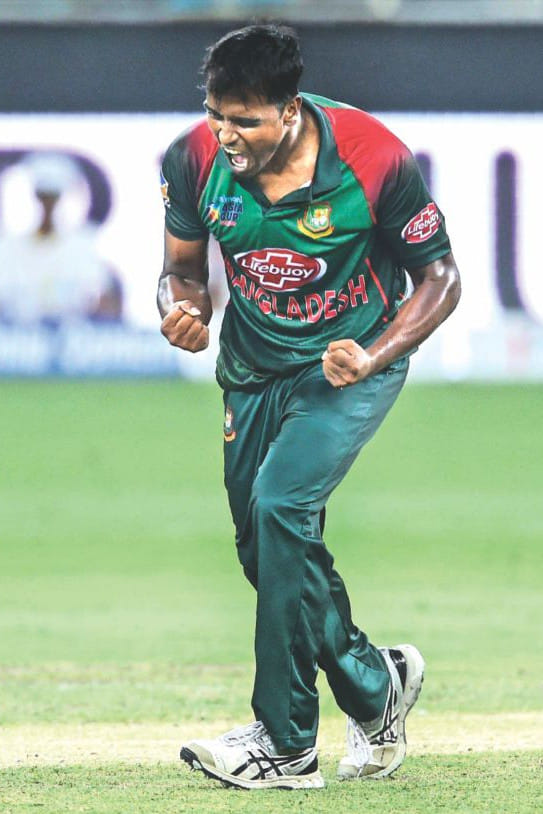
Related Topics
Related News
Bangladesh ODI skipper Mashrafe Bin Mortaza became the first ever active international cricketer to join parliament when he was elected from Narail-2 in the eleventh national election on Sunday.
Mashrafe, who was greeted by garlands from supporters after winning by a landslide, informed that although his new responsibilities will be quite demanding, his dedication to cricket will not be affected.
"I won't compromise anything when it comes to cricket till the World Cup. So I have the same cricketing mentality till then," said the charismatic captain.
Mashrafe has quite a busy schedule ahead as 2019 will begin with him leading defending champions Rangpur Riders in the Bangladesh Premier League (BPL) set to get underway on January 5. The right-arm pacer, who will return to Dhaka today, said that his focus will now shift to performing well in the BPL.
"The focus will be on that from tomorrow. However, as I always gave my best in my cricketing career, I will also try to replicate it while working here [Narail]."
ODI skipper Mashrafe will then travel to New Zealand for a three-ODI and three-match Test series against the hosts in February. The Tigers will then play an ODI tri-series against hosts Ireland and West Indies in May ahead of the World Cup in England from May 30.
It is a twist of fate that two different Asia Cups have been witness to two stages in Bangladesh's evolution. Along with evolution, of course, comes growth amid turmoil and Bangladesh have had much of both in the 2012 tournament and the ongoing one in the UAE where they will contest for the trophy against overwhelming favourites India.
In 2012, Bangladesh were rank outsiders but they surprised all pre-tournament forecasts by outclassing both Sri Lanka and India before enduring the heartbreak of losing the final by a mere two runs against Pakistan. 'So near, yet so far' was the soundtrack of heartbreak then, but years later cricketers and fans alike look back at that tournament wistfully as the point where Bangladesh cricket matured into a force to be reckoned with.
Six years later, however, it is a different evolution but it has come with the same growing pains. For long, even after their previous step up, the Tigers had been a team that could come up with stellar performances but tended to lose the plot when there were setbacks. And it was a certain kind of setback that hurt them the most: a loss of form or absence of one or more of the five cricketers who have thus far lifted Bangladesh to its greatest heights: skipper Mashrafe Bin Mortaza, Shakib Al Hasan, Tamim Iqbal, Mushfiqur Rahim and Mahmudullah Riyad. Incidentally, all of these cricketers were part of their first real ascension to cricketing prominence in 2012.
Now, however, the two cricketers from that bunch who have done more than any other to change perceptions and expectations of Bangladesh cricket -- Tamim and Shakib -- are out of the Asia Cup with injuries. In 2012, Shakib was the player of the series and Tamim had hit four consecutive half-centuries.
With Tamim already having flown home on September 18 with a fracture to his left hand, Shakib's absence was a shock to the team on the morning of their virtual semifinal against Pakistan in Abu Dhabi on Wednesday. Yet, just as the team had somehow found a way to win Sunday's match against Afghanistan without Tamim to stay in contention for the final, they roared into the final with a bowling and fielding performance worthy of Tigers against Pakistan to win by 37 runs around the time that Shakib was unpacking his bags in Dhaka.
"Both tournaments have their separate respect and value. In 2012 we could not win anything, we won rarely," said Mashrafe in the pre-final press conference at the hotel yesterday, a rest day after the exertions of the Pakistan match in the searing heat. "We won against big teams on the odd day. Now we were at a stage that whenever we won big matches, our best performers were Shakib, Tamim and Mushfiqur on most occasions. Mustafizur [Rahman] too. But to come to this stage without our two best players is a big achievement. The boys can feel proud of it, but there is still one match, if they can give their best shot I hope it will be a good match."
It was not too long ago that this was not the case. In South Africa last October Bangladesh surrendered without a whimper without Shakib in the Tests, and in the ODIs without Tamim in the last two matches. In the home tri-series final against Sri Lanka in January, they lost the plot after Shakib left the field with injury -- the same one to the left little finger that requires surgery now -- and succumbed to defeat not just in that match but in the following Test and T20I series.
Evolution, of course, retains the toughest and best bits from the past and Bangladesh have retained the toughest component in the skipper, who has inspired the team with bold decisions throughout the tournament, and the masterful Mushfiqur -- whose batting throughout has compensated for top-order failures. Regardless of who wins today, Bangladesh will be richer for having evolved into a team that can overcome the harshest setbacks and come out on top.
Mashrafe Bin Mortaza had boldly stated prior the Asia Cup final against India that he was not so cheap that he would judge himself by a trophy.
That trophy has eluded the Tigers once again following India's thrilling last-ball win on Friday in the Asia Cup final at the Dubai International Cricket Stadium.
Even with all the limitations and one setback after another, Mashrafe was so close to achieving the much-desired glory for the country but ultimately, he could not put his hands on the trophy. However, we must echo sentiments of Bangladesh's ODI skipper that there is no way we can judge the brave-hearted cricketer or his brigade by their failure to break the trophy jinx.
Sporting achievements are often measured by numbers and that is precisely why it will be difficult to analyse Mashrafe's true contribution in the region's biggest cricket competition.
"The boys should feel proud," responded the Bangladesh skipper after his team's three-wicket defeat in the final. "I think they did a good job without two key members. Missing Shakib [Al Hasan] and Tamim [Iqbal] was a big blow but I think boys have done a really good job," he continued.
Mashrafe had every reason to praise his charges. But we must thank the brave-hearted Tigers leader for the way he inspired his boys to overcome all the chaos. And it looked like he put the 'fear limits you and your vision' mantra to the ears of his charges.
If it all started by encouraging Tamim Iqbal to return to the crease at the fall of Bangladesh's ninth wicket in the 47th over against Sri Lanka in the opening match to accompany centurion Mushfiqur Rahim -- who almost single-handedly guided the side to a fighting 261 with his highest ODI score of 144 -- then it ended with the startling motion that saw him inspire opener Liton Das from the dressing room by thumping his chest.
Mashrafe effortlessly carried the burden of expectations throughout the tournament.
The young cricketers' failure to meet expectations has become the centre of discussion in recent times but this Asia Cup at least provided some hope thanks to this charismatic leader who tried his best to bring the best out of Liton, Mustafizur Rahman, Mehedi Hasan Miraz, Mohammad Mithun and even a proven performer like Mushfiqur Rahim didn't hesitate to praise the Mash-impact in their performance.
It was actually a bowling effort that Bangladesh can be proud of as they seemed out of the game on numerous occasions. However, the bowlers brought them back into the contention thanks to their never-say-die attitude. And it was no exception in the final battle against India.
There were not many who believed that Bangladesh could take the game to the last ball after they managed only 222 runs despite Liton and Miraz's brilliant 120-run opening stand. Mashrafe however once again proved that he was not a man who would give up on the job before showing any fight and he rightly credited his bowlers for putting up that fight.
"I hope we won a lot of hearts," Mashrafe said.
But a true champion could not stop here and that was why he said: "The positives depend on the individuals. I think losing to India twice was something that I didn't desire. When Shakib and Tamim are back, the team will do well in the future if we can hold on to this spirit."
Yes, it was the spirit that Mashrafe injected most among his charges to win the hearts and in future that spirit will help fulfil their ambitions. Still, when Mashrafe said that "we have lot of work to do" it means a lot for future success.
The target was just 223 for the vaunted Indian batting that has struck fear in the hearts of bowling line-ups the world over, but that it took them till the last ball of the 50th over to complete a three-wicket win in the Asia Cup final spoke volumes of the heart Bangladesh have shown throughout the tournament.
However, as the fireworks clouded the clear night sky at the Dubai International Stadium last night, Bangladesh skipper Mashrafe Bin Mortaza would possibly have been wondering what could have been had they batted out 50 overs for just the second time in the tournament, or if they had capitalised on the 120-run opening stand provided by centurion Liton Das and unlikely opener Mehedi Hasan Miraz.
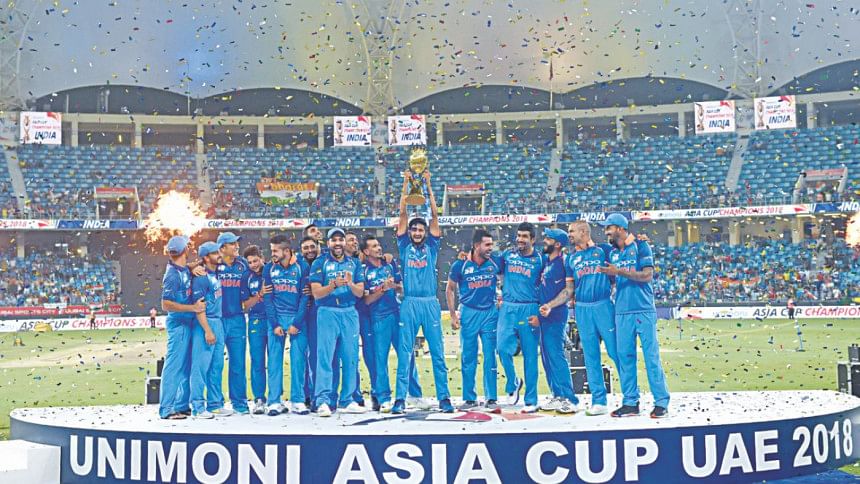
They fought till the end, even when just 18 were needed off four overs with five wickets in hand and then 13 off 18 balls. Rubel Hossain, who bowled brilliantly throughout for figures of 26 for two from 10 overs, had Ravindra Jadeja caught behind in the 48th over which cost just four runs. Mustafizur Rahman bowled another brilliant penultimate over that saw the back of Bhuvneshwar Kumar and conceded just three. With six needed off the last over, part-timer Mahmudullah Riyad bowled intelligently -- bowling the penultimate ball from behind the crease to confuse tailender Kuldeep Yadav -- and brought the equation down to a single needed off the last ball. But Kedar Jadhav, who had to leave the field with cramps and came back to resume batting after Jadeja's exit, managed to get bad on a full delivery and it trickled down to fine leg for the all-important single to be completed.
Hampered by the absences of stalwarts Tamim Iqbal and Shakib Al Hasan, Bangladesh showed outstanding spirit in fighting against all odds. In that the final was an apt one because they had done that throughout the tournament, adapting to setbacks and still finding a way to go past a feisty Afghanistan and a more-fancied Pakistan to make it to the final clash, but the wear and tear of an emotionally and physically exhausting tournament eventually manifested in the form of a batting failure at the most inopportune moment. They were left to rue another heartbreak in the Asia Cup final after falling at the last hurdle against Pakistan in 2012 and India in 2016.
Despite the batting implosion after their brightest start of the tournament, it was a bowling effort that Bangladesh can be proud of as they seemed out of the game on numerous occasions but clawed their way back each time.
Openers Rohit Sharma and Shikhar Dhawan had shot to 35 within five overs, but Nazmul Islam had the latter caught at mid off. Skipper Mashrafe then produced a beautiful away swinger to have Ambati Rayudu caught behind. Rubel hounded Sharma, giving him no room with balls that jagged back in till the Indian captain grew frustrated and hit him to square leg to be out for 47 and bring Bangladesh back into the match at 83 for three in the 17th over.
The Tigers kept a tight leash on Mahendra Singh Dhoni and Dinesh Karthik, ensuring their 53-run stand was a slow one, coming in 14 overs, before Karthik missed a straight one from Mahmudullah and was adjudged leg-before. Mustafizur Rahman had Dhoni caught in the 37th over for a 67-ball 36 and it was truly game on when Jadhav was forced to retire hurt in the following over. However, in the end, Bangladesh's wasted opportunities with the bat would come back to haunt them.
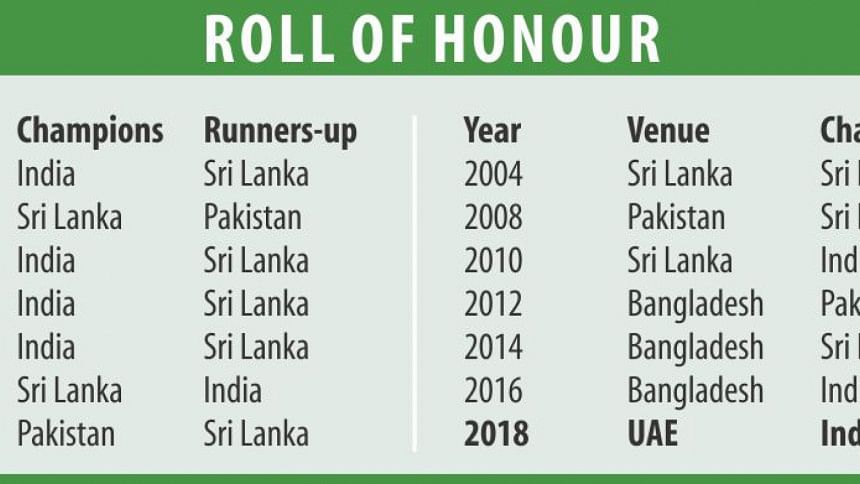
It had begun in ideal fashion for Bangladesh after Sharma asked them to bat first on a good wicket. If Mehedi -- a useful number eight batsman -- coming out to open disrupted India's expectations, the way Liton went after strike bowlers Jasprit Bumrah and Bhuvneshwar Kumar upended their applecart.
When the elegant but mercurial right-hander jumped down the pitch and clipped Bumrah, bowling at good pace, to the square leg boundary it was a statement of intent that Mehedi received, showing his calibre with a square driven boundary in the same over. Two successive fours off Liton's bat followed in the next over from Kumar and a lofted boundary off a 140kmph-plus Bumrah delivery in the seventh over.
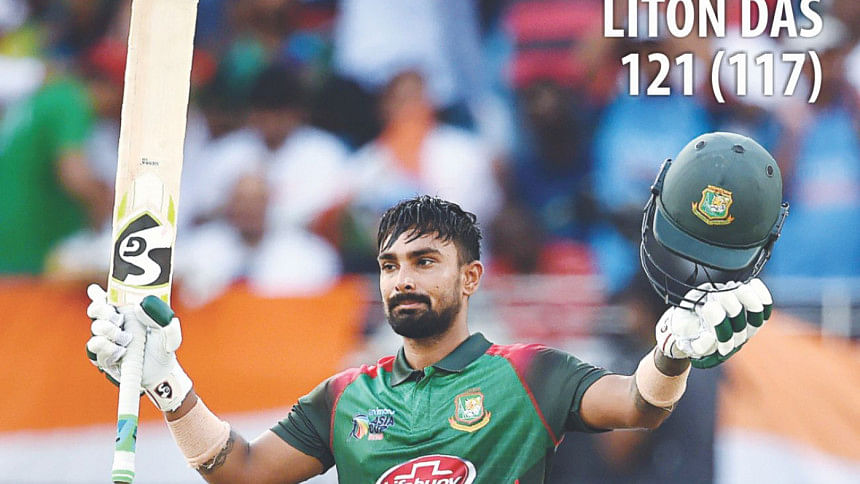
The leg spin of Yuzvendra Chahal was then clobbered for a six over square leg in the next over, which also saw the Bangladesh fifty coming up, without loss in a tournament that Bangladesh's openers had managed a best of 16.
Liton brought up his first ODI fifty off his 33rd ball, hitting the first ball of the 12th over from Jadeja for four. The time was right for the ill-advised shot and Liton did not disappoint, but Chahal did as he failed to latch on to Liton's skied slog sweep at mid on in the same over.
The life seemed to have chastened Liton, as he focused on playing balls along the ground from then, bringing up Bangladesh's first century opening partnership in 27 matches with an edged four in the 18th over.
However, in the 21st over with the score on 120, Mehedi departed when he cut Kuldeep Jadhav straight to cover point and that opened the floodgates. Imrul Kayes was adjudged leg-before for two in the 24th over off Chahal, a decision that stayed with the umpire's call upon review.
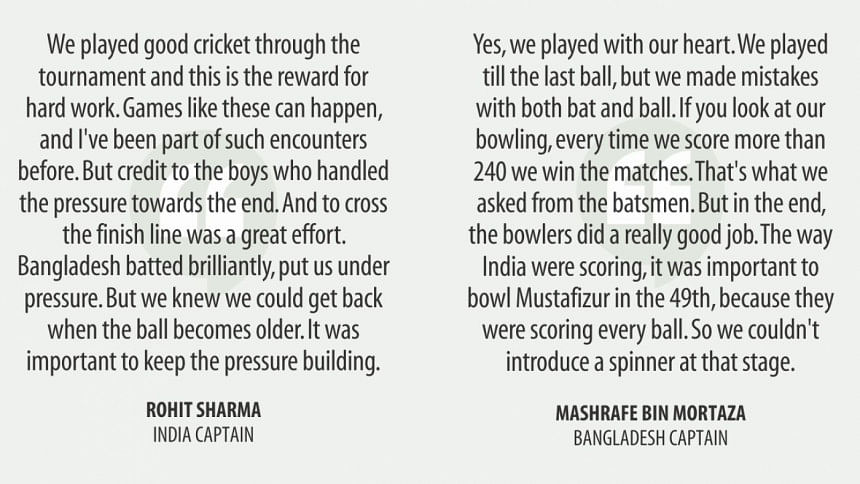
Mushfiqur Rahim, in supreme form, was expected to guide Liton to his century, but instead he hit a Jadhav long hop straight down deep midwicket's throat. The collapse that had so far happened at the top shifted to the middle order through a brilliant piece of fielding from Jadeja in the 28th over, when he dived to stop a well-hit cover drive from Liton and then threw at the non-striker's end, which was vacant as Mohammad Mithun was looking at Liton at hand-shaking distance at the other end.
Liton, then on 95 off 84 balls, rushed to his first international century off 87 balls in the next over with a single after hitting a swept four off Jadhav. Mahmudullah succeeded only in accompanying Liton to his century and little else as he followed fellow senior batsman Mushfiqur's example and holed out off Yadav in the 33rd over, meaning that Bangladesh had lost five wickets for 30 runs.
With the seniors having failed them, Liton and Soumya Sarkar then added 58 runs for the sixth wicket before Liton was stumped off Yadav by the finest of margins in the 41st over. The third umpire took ages to make his decision as a magnifier had to be used to determine that the part of Liton's foot that looked to be behind the line was actually not grounded, and he had to walk back for a splendid 121 off 117 balls with 12 fours and two sixes.
Mashrafe then continued the trend of seniors throwing it away as he needlessly tried to repeat a six hit off Yadav and was stumped in the 43rd over, leaving Soumya with the tail. The panic had fully set in by then as evidenced by Nazmul's run out in the 47th over. Two overs later, Soumya followed suit, failing to complete a second run and walking back with a 45-ball 33. Rubel Hossain lasted just one ball and was bowled by a Kumar yorker in the next as Bangladesh were all out with nine balls still to be played.
The morning of September 29 must have broken with some harsh light for the Bangladesh cricketers in Dubai and their loyal fans back home. It was much the same on March 23, 2012, when the Asia Cup final against Pakistan was lost in the final ball in Mirpur the night before. But as time wore on in 2012, the pain of defeat gave way to a feeling of accomplishment born from the feeling that Bangladesh cricket had finally broken through and had defeated all but one of their more celebrated neighbours before falling at the final hurdle.
On Friday night, the pain of failure at the final hurdle in the final ball -- this time against India -- haunted the cricketers and cricket lovers once again. Like 2012, this pain too shall pass but there will be a different sense of accomplishment from Asia Cup 2018.
Defeating Sri Lanka in the opener, then Afghanistan and Pakistan in must-win games may sound par for the course for the team fans have come to know since 2012. However, winning two of those matches without talismanic opener Tamim Iqbal and the one against Pakistan without both Tamim and ace all-rounder Shakib Al Hasan is not something that would have been expected. Making the final in the kind of heat they had never experienced before and doing it with setbacks that would have crippled Bangladesh sides of the past marks a new level.
To accomplish that, young players who were part of the support cast -- Liton Das and Mohammad Mithun -- and those who were leaders in waiting but often seemed to need a helping hand -- Mustafizur Rahman and Mehedi Hasan Miraz -- came to the fore. That, and the tremendous fighting spirit shown by the Tigers throughout the two-week long event -- not least in taking India's chase of 222 down to the final ball on Friday -- will be Bangladesh's biggest takeaway.
"Everyone may think about the 2012 Asia Cup final, but I see it a little differently," Bangladesh opener Tamim had said on September 13, two days before the tournament opener against Sri Lanka in Dubai. "The 2012 Asia Cup was the tournament where we first got the belief that we could beat any team -- that we could be competitive.
"I remember that; not my four fifties or how we lost the final by two runs. I remember how we played as a team and beat teams that no one would have thought we could beat. We beat India and Sri Lanka, and lost two very competitive matches against Pakistan."
Little did Tamim know then that it was his injury two days later, which forced him to fly out of the Asia Cup and back home, that would contribute to this tournament being remembered as the next big step for Bangladesh after 2012.
Since 2012, Bangladesh's graph has trended upward, with occasional dips. But a common feature of that rise has been the people doing the heavy lifting. Mashrafe Bin Mortaza, Shakib Al Hasan, Tamim, Mushfiqur Rahim and Mahmudullah Riyad have been the five cricketers who have worked wonders for Bangladesh cricket over much of the last decade.
But this Asia Cup was a departure from the norm because the Bangladesh team do not often do well with setbacks, especially when they have to fight with those setbacks against oppositions perceived to be superior. That happened in this tournament too -- losing the last group game against Afghanistan and the first Super Four match against India in abject fashion were a function of them struggling to overcome the setbacks of losing Tamim, scheduling confusions and having to play three matches in four days in 40-plus degree heat.
The recovery, and the architects of the recovery, will be the source of inspiration for future campaigns. While it is true that there was magical captaincy from Mashrafe, he still had to rely on opener Imrul Kayes to fly in on Saturday night and score a match-winning fifty against Afghanistan on Sunday from number six, rescuing the side in partnership with Mahmudullah from 87 for five. Faced with non-performing opening pairs, Mashrafe took the wildcard decision to open with number eight batsman Mehedi in the final, but the youngster still had to show the courage to be a part of a 120-run opening stand with a sublime Liton. For his part, Liton was the one who had to repay his captain's continued faith, and he did so with a maiden century in the most important game of the tournament.
Mushfiqur was Bangladesh's best batsman in the tournament with scores of 144 in the opening game and 99 against Pakistan. In both those innings, however, Mithun was an indispensable foil with innings of 63 and 60 in century-plus partnerships that rescued Bangladesh from top-order collapses.
In each of Bangladesh's three wins in the tournament, someone other than the Big Five stepped up and took responsibility. The bowlers, led by Mashrafe, Mustafizur and Mehedi, were consistent throughout and the spirited fielding was the flag-bearer of the team's never-say-die spirit.
"The positives depend on the individuals. I think losing to India twice was something that I didn't desire. When Shakib and Tamim are back, the team will do well in the future if we can hold on to this spirit," Mashrafe said after the match.
There will certainly be heartbroken fans who will rue another missed opportunity, another last-ball failure. But this tournament showed that the ingredients long craved for outside the Big Five are very much present and the work in progress is waiting for completion with the return of the two big stalwarts.
The takeaway from this latest heartbreak is that it will just be a matter of time before bittersweet gives way to unadulterated joy.
 For all latest news, follow The Daily Star's Google News channel.
For all latest news, follow The Daily Star's Google News channel. 






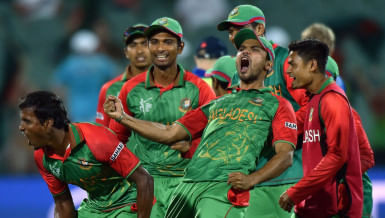
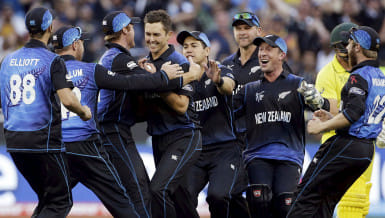
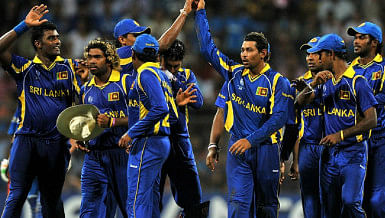
Leave your comments